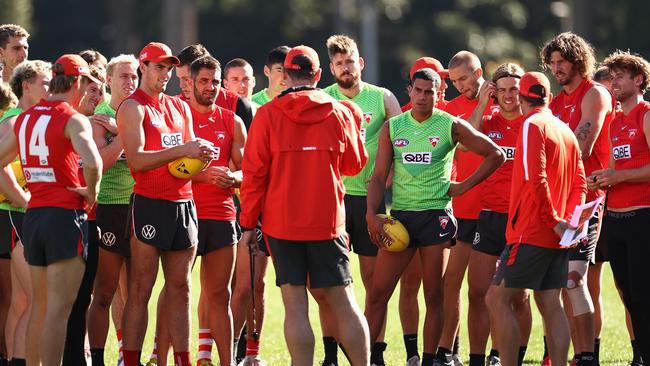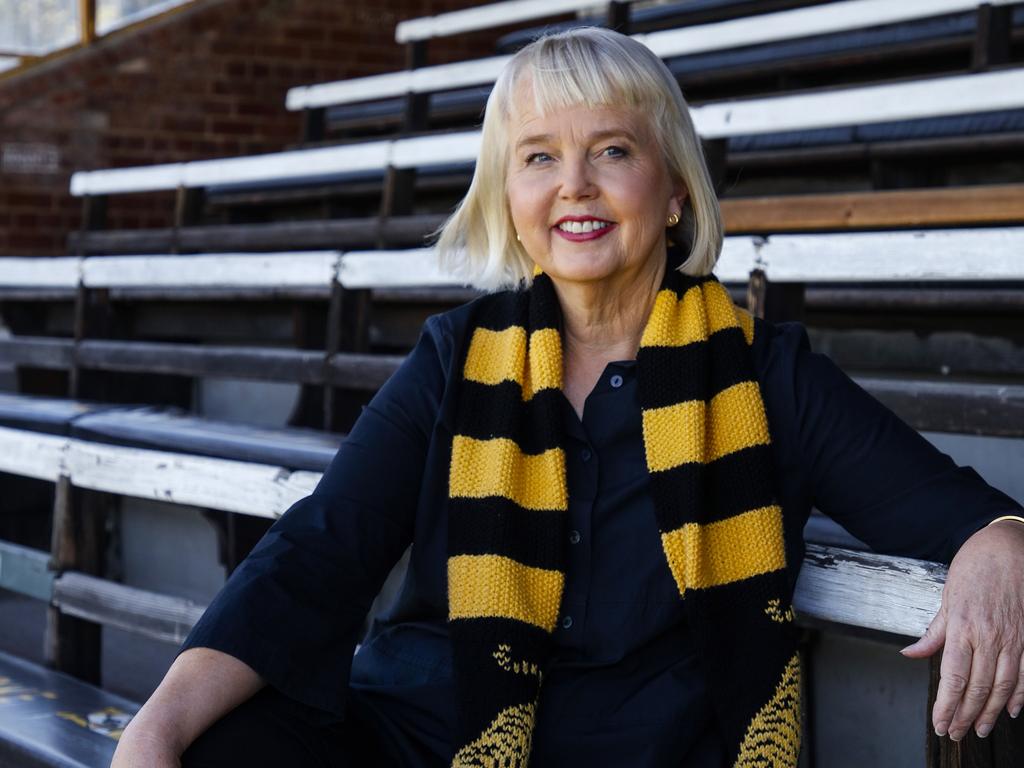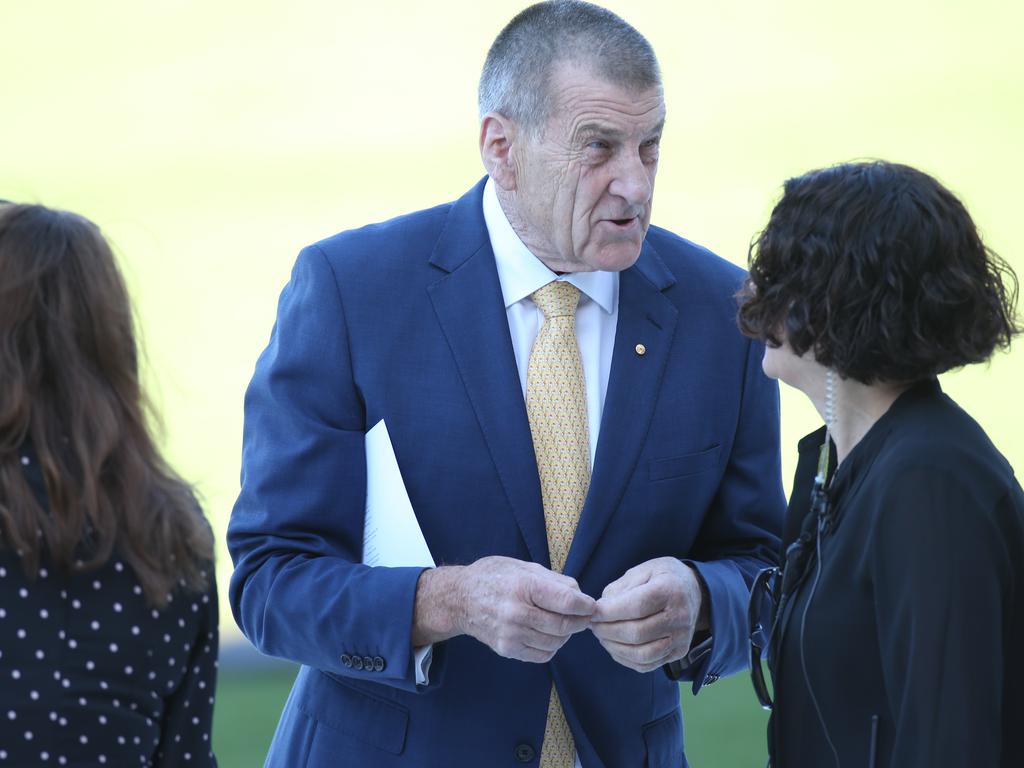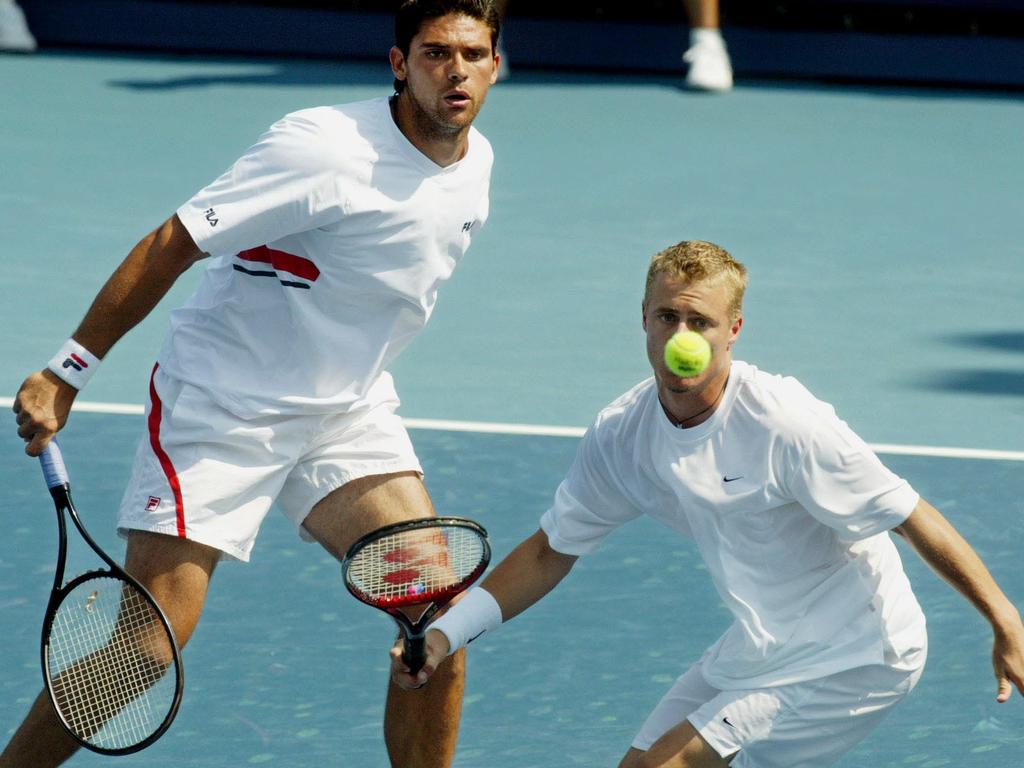The $55m cuts that could drive AFL coaches out of the game
Recently appointed AFL Coaches Association chief executive Alistair Nicholson said the stresses of the role could force the next legendary coach out of the game

There is widespread concern among AFL coaches about the stress caused by the cost-cutting measures enacted due to the pandemic.
Alistair Nicholson, who is the chief executive of the AFL Coaches Association, said members were reporting the current working conditions were not sustainable long term.
Some have made public their concerns over the past 12 months about the pressure generated by the significant cuts to the AFL soft cap at the height of the Covid-19 crisis.
No matter their financial strength, all clubs are restricted to spending just over $6.1 million on their football department. The 33 per cent reduction from 2019 levels equates to more than $55 million competition wide.
The cohort runs from senior coaches to first-year assistants, from Melbourne to Perth and up to Brisbane, and their message to the former Demon has been consistent.
They are struggling. As one member said; “I’m getting through. But I don’t have any time to innovate or to think about how we improve or get better because I am just keeping up now.”
Nicholson fears that if the situation continues, there will be an exodus of high-calibre people from the industry, noting the game risked losing champion coaches of the future.
“I have not had anyone come in and say, ‘No. It is in pretty good shape at the moment. We can do a bit better’,” Nicholson told The Weekend Australian.
“Each group has been consistent in saying that how it is working as a coach now is not sustainable. It has been from all the groups. We are a profession that is under pressure.
“We have quality people. But my concern would be that we will lose the eight, nine or ten-year coaches that are the spring into the next head coach.
“We don’t want those guys falling out (of the league), because one of them might be the next five-time premiership coach.”
Nicholson is almost two months into his role in charge of the AFLCA after previously serving as the chief executive of the Australian Cricketers’ Association from 2014.
A defender with Melbourne from 1997 to 2006, Nicholson played under Neale Daniher and appreciates the role coaches play in developing people, not just footballers.
He estimates that of the 140 or so senior and assistant coaches currently in the AFL system, he would have played with or against about two-thirds of the membership and is concerned by what he has been told.
Four-time premiership coach Alastair Clarkson, the longest serving and most successful coach of those currently in senior positions, detailed his worries last October.
“I am a bit concerned for our profession. Some have lost their lives, not directly because of coaching, but some of it has been stress related,” Clarkson said.
Former North Melbourne coach Rhyce Shaw, who is now working for the Suns, was hospitalised at the end of last season after his mental health deteriorated in the hub.
The marriages of some coaches ended during last season, with the workload and stress and relocation to hubs considered a factor.
Earlier this month, Sydney coach John Longmire said he was not sure the current mix was right in terms of the amount cut from the soft cap.
“There has to be an acknowledgment from the AFL that this is the case. It is not about getting the violin out. It is just a fact,” he said.
Brisbane legend Michael Voss, who has held the senior role and is now an assistant at Port Adelaide, told The Weekend Australian he feared for “the human toll”.
“Six coaches are now doing what ten coaches used to do,” he said.
“Everyone has their heads down and we are working as hard as we can. But you can’t do that for a sustained period of time without breaking people.”
Nicholson was in Brisbane this week to visit the Lions coaching group and has met with 15 clubs in the six weeks of his tenure.
“They all very much enjoy the game. They like the game. They love the game. They enjoy coaching,” he said.
“But how it is wired up in the workload and the financial terms at the moment, it is a significant challenge for some.
“There are a third less coaches overall. So you have less people and they are doing more and they are also doing that for less remuneration as a general rule.
“What that has meant is that the workload that is spitting out is not sustainable. Six or seven days working week to week, it is relentless.
“Add the scrutiny of the media and all of those things, the qualitative conversations say it is not sustainable what we are doing at the moment.”
In the richest football code in the country, the AFL’s senior coaches are the front men for their clubs and also the sport.
Dustin Martin and Lance Franklin dazzle with their on-field deeds.
But when it comes to addressing the topics of the day or the controversy of the week, it is usually the coach who does the talking.
They are available to the media after every match and also appear once a week at a press conference.
A number also have regular radio or television gigs, though Western Bulldogs coach Luke Beveridge has reduced his appearances this year citing the increased workload.
There is a feeling among the coaching group there is not enough respect for the role they play in promoting the game and dissecting its nuances for the public.
Whenever there is criticism regarding congestion, for example, the coaches cop the blame. If a side is struggling, the public rounds on the coach.
It can be a rewarding experience but, as Nicholson noted, it is not surprising mental health problems can arise.
It is an area the 43-year-old hopes to improve in conjunction with the AFL, which is reviewing the soft-cap at the moment.
“Are they receiving enough assistance? Is there enough respect for their roles?” Nicholson said
“Do they sit in the top three priorities for the league? The coaches are an important group. We have to really attack (mental wellbeing) as an industry. I think there is a lot more we can do there.
“I am starting to have some conversations with the AFL around what they have in place and how we get that into the system.”
It is not just the coaches who are affected according to West Coast coach Adam Simpson.
The 2018 premiership coach joined Longmire on a coaching committee in March aimed at identifying potential problems if the cuts made during Covid-19 were too severe.
He believes the resource stretch will eventually harm the game because clubs will be less willing to draft talented footballers who are deemed potential behavioural risks.
Simpson raised the case of Willie Rioli, who will return to West Coast despite his recent drug issues, as a case in point in an interview prior to their loss to the Giants last weekend.
“Over the years, we have employed (people) who are too good for the AFL. They love the game like I do but they are way more qualified to do other things, but we are losing them,” he told SEN.
“Willie is a great example for us. Part of the conversation is that with 40 per cent cutbacks on resourcing, how are we going to continue to grow Willie, and educate him, and keep him on the straight and narrow with less people to support this?
“It then ripples to the draft. What do you think it is going to do to the draft in the future?
“We want to take risk-takers. They can be our best players. But it comes with a lot of management. It is not coaching. It is administration. It is welfare. It is health and wellbeing.
“And eventually the product will change. That is the concern. At the moment, we are in the trenches and we are seeing significant changes in health and wellbeing.
“It is now time to look at (the cost-cutting) again. It is not about money. It is about the people and the product. At the moment, it is getting hard. And what it will hurt is the draft.”
Nicholson has met with the AFL to outline the overall position of the coaches and is hopeful it will be a fruitful relationship.
The financial position of the league is nowhere near as dire as what was feared in March last year, though the pandemic is clearly still causing issues, as the chaos of the past week has shown.
The AFL avoided financial armageddon when reporting a $22.8 million loss, though clearly that was reached only through massive sacrifices in terms of salaries amid mass job losses.
McLachlan told club bosses this week the AFL is looking at a reduction of about $200 million in earnings this year when compared to 2019.
“It is not a case of ‘We need to shoot back to what it was.’ It is just that this level is not sustainable. That has been the main message I have been getting,” Nicholson said.
“It has been a considered message. It is not just the head coaches either. It is people who have been coaches in the AFL industry for quite a long time and have lots of experience.”








To join the conversation, please log in. Don't have an account? Register
Join the conversation, you are commenting as Logout